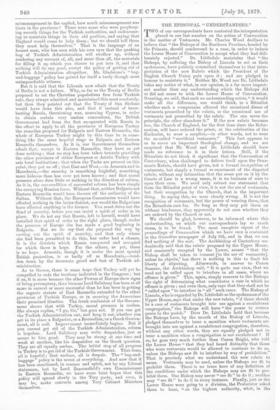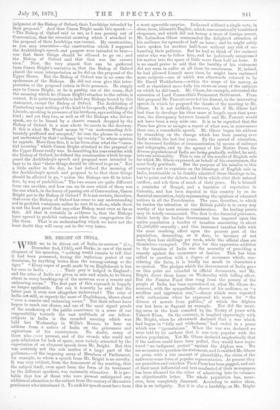THE EPISCOPAL "UNDERSTANDING."
TWO of our correspondents have contested the interpretation placed in our last number on the action of Convocation in the matter of Vestments. Mr. Charles Wood declines to believe that "the Bishops of the Southern Province, headed by the Primate, should condescend to a ruse, in order to induce the Lower House of Convocation to accept what they had deli-
berately rejected." Dr. Littledale maintains that "the Bishops, by suffering the Bishop of Lincoln to act as their spokesman, have publicly committed themselves to that inter- pretation of the new Rubric which tie President of the English Church Union puts upon it; and are pledged in honour to maintain it." Neither Mr. Wood nor Dr. Littledale takes any notice of what, in our opinion is a far more import- ant matter than any understanding Which the Bishops did or did not come to with the Lower House of Convocation. Granting, we said, that such an understanding exists," it would make all the difference, one would think, to a Ritualist whether such a compromise allowed the occasional disuse of vestments prescribed by the rubric, or the occasional use of vestments not prescribed by the rubric. The one saves the principle, the other abandons it." If the new rubric becomes law, the Church of England, for the first time since the Refor- mation, will have ordered the priest, at the celebration of the Eucharist, to wear a surplice,—in other words, not to wear the so-called '‘‘ sacrificial vestments." This fact appears to us to cover an important theological change, and we are surprised that Mr. Wood and Dr. Littledale should have made no reference to it in their letters. Still, if the Ritualists do not think it significant that the Convocation of Canterbury, when challenged to deliver itself upon the Orna- ments Rubric, should have given, not a formal recognition of vestments, but simply a formal re-enactment of the disputed rubric, without any intimation that the sense put on it by the Courts of Law is a wrong sense, it is no business of ours to open their eyes. We need only retract our statement that from the Ritualist point of view, it is not the use of vestments, but their recognition by the Church, that is the important thing. In saying this, we were clearly wrong. It is not the recognition of vestments, but the power of wearing them, that the Ritualists care for. So long as they may put them on without hindrance, they apparently do not care whether they are ordered by the Church or not.
We should be glad, however, to be inform ed where this understanding, on which our correspondents lay so much stress, is to be found. The most complete report of the proceedings of Convocation which we have seen is contained in the Guardian newspaper of July 9th, and in that we can find nothing of the sort. The Archbishop of Canterbury un- doubtedly said that the rubric proposed by the Upper House, and commonly accepted by the Lower, means "that the Bishop shall be taken to consent [to the use of vestments], unless he objects," but there is nothing in this to limit his liberty of objecting. Afterwards, in answer to Canon Sumner, the Archbishop said, "It is quite our view, that we need not be called upon to interfere in all cases, where no offence is given." This, again, simply reserves to the Bishops the right of determining what constitutes a case in which no offence is given ; and even then, only says that they shall not be "called upon "to interfere in" all "such cases. The Bishop of Lincoln, who is regarded by Dr. Littledale as the spokesman of the Upper House, says that under the new rubric, "if there should be a case of vestments brought into use against a recalcitrant congregation," the Bishops will have "the power to restore peace to the parish." Does Dr. Littledale hold that because the Bishops have, by the mouth of the Bishop of Lincoln, pledged themselves to issue a monition where vestments are brought into use against a recalcitrant congregation, therefore, without any other words, they are equally pledged not to issue a monition when a congregation is not recalcitrant? If so, he goes very much further than Canon Bright, who told the Lower House "that they had heard distinctly that those who wore vestments would be allowed to continue to do so, unless the Bishops saw fit to interfere by way of prohibition." That is precisely what we understand the new rubric to mean. Vestments may be used, unless the Bishops see fit to prohibit them. There is no trace here of any definition of the conditions under which the Bishops may see fit to pro- hibit them. One Bishop may never "see fit" to do it ; another may "see fit" to do it in every instance. Finally, just as the Lower House were going to a division, the Prolocutor asked them to hear, "on the highest authority, what, in the judgment of the Bishop of Oxford, their Lordships intended by their proposal." And then Canon Bright made this speech :— "The Bishop of Oxford said to me, as I was passing out of Convocation' that the essential meaning which I attached to the proposal of their Lordships was correct. My construction, as you may remeiaber—the construction which I supposed the Archbishop's speech and purpose were intended to bear— was that these things should be allowed to go on ; and the Bishop of Oxford said that that was the correct view." Now, the very utmost that can be gathered from Canon Bright's narrative is, that the Bishop of Oxford placed the samo interpretation as he did on the proposal of the Upper House. But the Bishop of Oxford was in no sense the spokesman of the Bishops. He did not even give this inter- pretation of the proposed rubric in their presence. He simply says to Canon Bright, as he is passing out of the room, that the meaning which he (Canon Bright) attaches to the rubric, is correct. It is quite impossible to hold any Bishops bound by this statement, except the Bishop of Oxford. The Archbishop of Canterbury says nothing of the kind in his speech; the Bishop of Lincoln, speaking in presence of his brethren, says nothing of the kind ; and yet they two, as well as all the Bishops who did not speak, are to be bound by a chance remark dropped by the Bishop of Oxford to a man whom he meets in the doorway. If this is what Mr. Wood means by "an understanding deli- berately proffered and accepted," he uses the phrase in a sense not understood by that" ordinary lay society" to whose opinion he appeals. More than this, it is far from clear what the "essen- tial meaning" which Canon Bright attached to the proposal of the Upper House really was. In describing his conversation with the I3ishop of Oxford, he defined the construction which he sup- posed the Archbishop's speech and proposal were intended to bear to be that " these things should be allowed to go on." But a little earlier in the day, he had defined the meaning of the Archbishop's speech and proposal to be that these things should be allowed to go, "unless the Bishops saw fit to inter- fere, by way of prohibition." The two senses are quite different from one another, and how can we be sure which of them was the one which, in the hurry of passing out of Convocation, Canon Bright put to the Bishop of Oxford It is not certain, therefore, that even the Bishop of Oxford has come to any understanding not to prohibit vestments unless he sees fit to do so, while there is not the least proof that any other Bishop went even so far as this. All that is certainly in evidence is, that the Bishops have agreed to prohibit vestments when the congregation dis- like them. That is an understanding which we have not the least doubt they will carry out to the very letter.



































 Previous page
Previous page